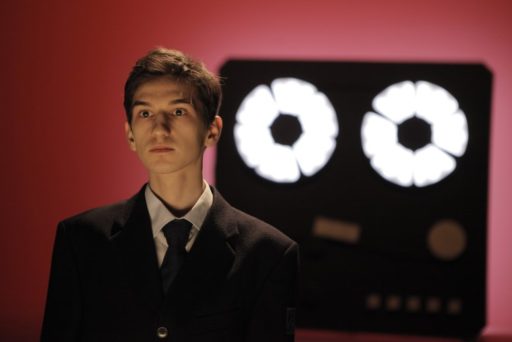Review: Uppercase Print (2020)

Is the docu-theatre an existing term, especially in the context of cinema? If not, it has just been forged to properly describe one of two Radu Jude’s Berlinale Forum premieres, Uppercase Print. When it comes to hybrid cinema, the possibilities of blending the content and the commentary by the means of documentary filmmaking, archival collage, the infusion of fiction / narrative material and even theatre and performance arts, are close to endless. With one of the finest and most clever filmmakers of today, Radu Jude, at commanding post, we can only talk in absolutes. Uppercase Print is a shamelessly bold storytelling experiment that works, even though it should not.
Radu Jude has earned his reputation as one of the loudest critics of the official stance Romania takes about the country’s crimes in the past. Whether it is the enslavement of Roma people in the feudal times (as seen in his fiction title Aferim!), the role Romania played in Holocaust (Jude’s previous documentary The Dead Nation), or the notion of sweeping it all under the rug (Karlovy Vary Crystal Globe winner I Do Not Care if We Go Down in History as Barbarians), Jude is very vocal and innovative in the terms of style.
Uppercase Print is the first film in which he deals with Romania’s communist past and the crimes of the notorious Nicolae Ceausescu regime. Case in point, the fate of a high school lad who, in the early 80s, dared to publicly criticize the regime by writing graffiti in the titular uppercase print. The youngster, Mugur Calinescu, was arrested, interrogated and finally broken and made the asset of the infamous Securitate intelligence agency.
Mugur got his ideas by listening to Free Europe Radio, then one of the crucial anti-communist media, but unlike others who listened to it just for the sake of music, he took the direct political action the only way he could: writing on the walls at night, in black or white chalk, in uppercase print, calling to an end of shortages and declaring the support for Poland’s Solidarity syndicates. As it turned out, the provincial town of Botosani was not the best place for publicly expressing the lust for freedom, there was nobody on Mugur’s side, his acts were treated almost as terrorism.
The story of Mugur and his case was done in a way of filmed theatre, with actors playing characters of Mugur, his mother, his father and the interrogators and witnesses, and all of the action takes place on a singular, three-part set, with Jude basically pointing the camera to one or more actors who deliver their lines in a flat, declamatory fashion. It seems pretty strange and definitely takes some time for a viewer to get used to it, but there are solid reasons for that kind of counter-intuitive approach. Firstly, most of the personae dramatis, Mugur included, are no longer with us, or are otherwise unable or unwilling to tell their part of the story in the form of interviews. Secondly, the step between the actual case and this film is the eponymous non-fiction stage play written by Gianina Carbunariu.
On the other hand, the commentary level of this hybrid film was constructed by using only the means of documentary cinema. Jude opted for a collage of archival material from the same period of time, highlighting what kind of society the communist Romania actually was. The recurring topics in the material is absurdity, censorship, political protocol, authoritarian tendencies in every aspect of living. A satirist by nature, Jude blends the footage well, with a vibrant sense of humour, which becomes a problem tonally and ethically only at one point, near the very end of the film when we get informed of Mugur’s fate.
Uppercase Print might not be everybody’s cup of tea, but Jude certainly remained faithful to himself. His topics are the darkest of the spots of Romanian authoritarian past, and Uppercase Print remains on the same course, but is still wildly innovative and extraordinary. The style matches the substance here, against all odds, to create a top-notch, whip-smart, genre defying and genre defining piece of cinema.
Original Title: Tipografic Majuscul
Year: 2020
Country: Romania
Language: Romanian
Runtime: 128′
Directed by: Radu Jude
Written by: Radu Jude (based on a play by Gianina Carbunariu)
Cast: Serban Lazarovici (Mogur Calinescu), Bogdan Zamfir (Securitate officer), Ioana Iacob (The mother), Serban Pavlu (The father), Alexandru Potocean, Constantin Dogoiu, Silvian Valcu
Produced by: Carla Fotea, Ada Solomon
Cinematography by: Marius Panduru
Editing by: Catalin Cristutiu
Assistant director: Cristina Iliescu
Colourist: Claudiu Doaga
Production companies: microFILM, Televiziunea Romana (TVR1)
















